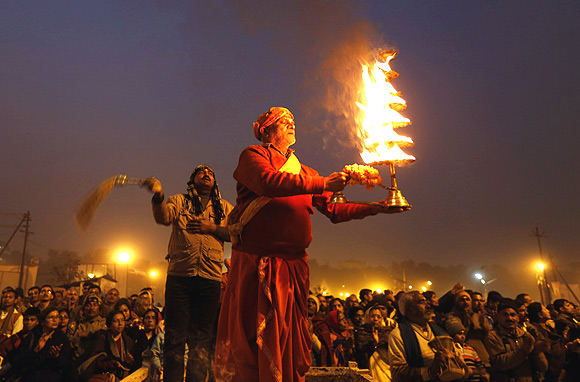Why not agree that, yes, India is a Hindu country though not all Indians are Hindus?
And that for those who are not, our Constitution is sturdily secular and always will be, says Karti Sandilya.
Is India a Hindu nation?
In most other countries, a question of this nature would be straightforward enough. If some 85 per cent of the population of a country is classified as Hindu, then surely it would be a Hindu country.
Yet, in India, things are never so simple. Here, the question elicits impassioned (violent?) — and diametrically opposite — responses.
For many in the Westernised elite, the question itself is an affront to their vision of a tolerant and secular country, home to many faiths and hospitable to many more.
For many Indians, however, their country is the cradle of Hindu civilisation and culture and all who call it home are heirs to this heritage, whatever be their religious beliefs.
This clash of opposing views of India is not recent; it has bedevilled political discourse ever since the country became independent. This was, perhaps, to be expected in the aftermath of a bloody partition, predicated on the conviction of many — though not all — Muslims that they could not co-exist with Hindus in one country. Since 1947, then, India has been wrestling with this existential issue.
In the first few decades, the dominant ideology favoured the view that India was essentially a secular country, with little thought given to the absurdity of such a proposition. (If you doubt that last statement, name me another country that perceives itself thus).
But the rise of the Bharatiya Janata Party, on the back of the Ram Janmabhoomi movement, from two seats in the Lok Sabha in 1984 to leadership of the National Democratic Alliance coalition, put paid to that pretence (for that is all it ever was). Now that the BJP is once again the party of government, the question was bound to be debated afresh.
It has not taken long for the controversy to be revived. Within months of the 2014 Lok Sabha election, elements of the Sangh Parivar made statements to the effect that all Indians are Hindus. Predictably, this drew horrified rejoinders from newspaper columnists and op-ed writers, who — disingenuously or otherwise — take such statements literally.
Since then, debate has engaged the lunatic fringe at one extreme of the political spectrum and the liberal chattering classes at the other. Each sees one part of the picture, yet misses the whole. For surely, the reality is clear enough: India is not a secular country; it is, instead, a Hindu country with a secular Constitution.
What does this mean?
Each of its citizens is free to practise his or her faith (or non-belief), yet each is also heir to the predominantly Hindu culture and ethos of this land. Its distinguishing feature is syncretism, the open-minded belief that no opposing school of thought is entirely without merit. Better, therefore, to identify the kernel of truth in a rival belief system than to reject it altogether.
Hindu culture, thus, borrowed from all the invaders who came to the subcontinent and stayed (or left). Yet who can doubt that its bedrock remains quintessentially Hindu? And that all Indians — be they Hindu or not — bear the stamp (or should) of this uniquely tolerant outlook and way of life.
India’s secular Constitution — itself a manifestation of its Hindu character — ensures, nay guarantees, that every citizen can profess whatever faith or non-faith he or she chooses. The government shall have no interest in a citizen’s religious choices nor shall it seek to promote any religion.
But that does not mean that we should be shy of acknowledging that India is a Hindu country, in the sense described here. Indeed, we should affirm this without restraint, since the culture of a country can be quite distinct from its majority religion.
Just take a look at Indonesia, a Muslim-majority country that has a statue of Krishna and Arjuna in an important square in Jakarta and which recently installed a statue of Saraswati in front of its embassy in Washington, DC.
When the world’s largest Muslim-majority country can do this as the most natural thing in the world, yet the world’s largest Hindu one cannot, there is surely something fundamentally wrong.
Or, nearer home, consider Bangladesh, whose national anthem was composed by Rabindranath Tagore and is proud of its Bengali culture. (In passing, I recall that when I lived in Argentina, Indians were — and may be still are — called Hindues, not Indios. The latter word referred to the original inhabitants of South America, most of whom did not survive the coming of the Europeans.)
So, it’s past time to lower the political temperature on this needlessly emotive question of Indian identity. Why not agree that, yes, India is a Hindu country though not all Indians are Hindus? And that for those who are not, our Constitution is sturdily secular and always will be.
With that out of the way, can we concentrate on the very real task of enabling all Indians to aspire to decent lives?
IMAGE: The evening arti on the banks of the Ganga. Photograph: Ahmad Masood/Reuters
Karti Sandilya is a former Indian Foreign Service officer.
Source: Read Full Article

